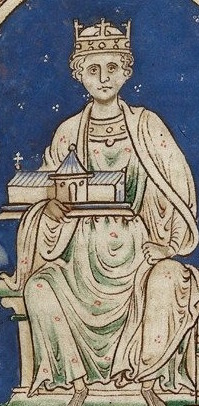
King Henry II and Thomas Becket: the beginnings of a reconciliation?
On this day 850 years ago, Pope Alexander III (1159-81), by now weary and exasperated with both King Henry II of England (1154-89) and Thomas Becket, Henry’s archbishop of Canterbury, issued letters which set out terms for a ‘form of peace’ between the two men. Becket had been in exile since 2 November 1164 following his clashes with Henry over the rights and liberties of the English church. The quarrel between the two men was particularly focused on the issue of ‘criminous clerks’, that is, men in holy orders who were convicted in lay courts of criminal offences. The crimes these men committed were often serious enough, murder and rape for example, to warrant punishment by mutilation or death. Henry II had succeeded King Stephen on the throne of England, in whose reign order had famously broken down. Henry was determined both to restore his royal rights and order to the realm of England. As far as Henry was concerned, clerks who broke his laws deserved punishment in his courts, as indeed had been the case during the reign of his grandfather, King Henry I (1100-35). Any other process was not only an encouragement to lawlessness and criminality, but an affront to Henry’s royal dignity.
To us, it might seem incredible that clerks could escape punishment in secular courts, but over the course of the last one hundred years the Church had increasingly asserted its muscle when faced with powerful secular rulers. Ecclesiastical reformers argued that the Church and its ministers had to be free from overbearing and unjustified lay control. Surely it was the Church itself, not the secular prince, argued the canon lawyers and theologians, who should have jurisdiction over those in holy orders. Otherwise, how else could the Church retain its independence from lay power? What was to stop the prince from using his authority over the Church to bend it to his will? They agreed that criminous clerks deserved to be punished, but they claimed that it was for the ecclesiastical authorities, not the secular courts, to determine and administer the appropriate penalties. Moreover, was it not the case that convicted criminous clerks faced the prospect of ‘double punishment’, whereby clerks would be degraded from holy orders in an ecclesiastical court and then punished as a layman by a secular court? In 1163 and 1164 Becket had argued that the clergy had to be immune from secular jurisdiction, for which he had incurred Henry’s fearsome wrath and displeasure. The problem for Becket and others in the Church was that the Church had simply not come up with a system for dealing with clerks who committed serious felonies. Too many escaped punishment for serious offences, and some even went on to reoffend. To Henry, the king responsible more than other for the development of the ‘common law’ in England, that is a law that was common to all, this was intolerable. The two men had been unable to reconcile, and in November 1164 Becket had fled to France to avoid Henry’s vengeance.
Now, after five long and difficult years, during which time Becket had with his obduracy and inflexibility, in exile, often tested the patience of Pope Alexander and King Louis VII of France (1137-80), two men who ostensibly supported him and his cause, Pope Alexander seems finally to have lost all patience. On 19 January 1170, he issued letters which set out the terms for a reconciliation between the two men and he ordered Rotrou, archbishop of Rouen, and Bernard, bishop of Nevers to have both men agree to their provisions. Henry had forty days to comply or face the imposition of an interdict on all his continental lands. Was peace and an end to the dispute now in sight? In my next blog on this subject, we shall see how Henry and Becket responded to the pope’s efforts.








Annie Gowers
19th January 2020 at 1:17 pmCannot wait for the next instalment Ian.
Annie (Jackie’s friend)
Ian Stone
19th January 2020 at 5:44 pmThank you. It’s going to be an interesting year watching to see how this pans out…
Judy Darby
20th January 2020 at 1:41 pmFascinating as always, Ian. Many thanks. Was this clerical immunity the same thing as ‘benefit of clergy’?
Ian Stone
21st January 2020 at 8:42 amAbsolutely. To claim the ‘benefit of clergy’, and thereby have one’s case moved from a secular to an ecclesiastical court, a defendant would undergo a reading test as, in the early Middle Ages at least, literacy tended to go went hand-in-hand with clerical status. Usually, the defendant would be asked to read the first verse of Psalm 51, Miserere mei, Deus, secundum misericordiam tuam (O God, have mercy upon me, according to thine heartfelt mercifulness). However, literacy rates were higher than we might think and many outside holy orders could read and therefore claim the benefit. It was not unknown, even, for illiterates to learn the first verse and benefit too.
This all became too much for the Tudor monarchs with their desire for systemisation and centralisation. Under Henry VIII, several offences were deemed to be ‘unclergyable’ and so could not be removed from the secular courts. Once Henry had broken with Rome, papal condemnation of these moves was somewhat irrelevant. Then, in 1575, Henry’s daughter Elizabeth changed the law so that the benefit of clergy no longer transferred the case to an ecclesiastical court. Instead, after conviction a first-time offender could claim the benefit and receive a more lenient sentence. Essentially it became something to be pleaded in mitigation.
In 1706 the reading test was abolished and as part of the eighteenth-century legal reforms which saw the development of the ‘bloody code’, more offences became unclergyable. It was finally abolished in 1823.
Ian Stone, historian | Who was Thomas Becket?
28th February 2020 at 3:58 pm[…] King Henry II and Thomas Becket: the beginnings of a reconciliation? […]